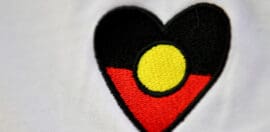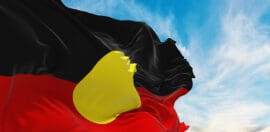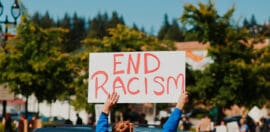The courage to feel uncomfortable: what Australians need to learn to achieve real reconciliation.

1 June 2022 at 4:48 pm
Prime Minister Anthony Albanese’s election night speech put recognition of The Uluru statement from the heart in the minds of the nation. But real reconciliation is deeper and more complex, writes Bindi Bennett, Associate Professor of Health at Bond University.
“Be Brave, Make Change” is the mantra for this year’s National Reconciliation Week. This is a call urging all non-Indigenous Australians to be allies and take up unfinished reconciliation actions for a fairer nation for all. But often reconciliation actions are observed as insincere and tokenistic. Instead, non-Indigenous people’s actions need to be real, effective and aimed at long-lasting change.
Historical acceptance is one of the five dimensions of reconciliation. Acceptance would mean all Australians acknowledge this nation’s history of injustice, colonisation, dispossession, displacement, exploitation and violence against First Nations people. However, this endeavour to learn is often hindered by hesitant white educators who don’t feel confident or capable to include Indigenous perspectives in their classrooms.
The topic of Australia’s difficult history is also often rebutted as First Nations people’s failure to move on and simply “get over it”.
If non-Indigenous people are to be honest about our nation’s efforts to achieve reconciliation, it’s time to stop trying to being “seen” to be engaged in First Nation issues, and instead take the time to educate themselves about what is often uncomfortable to learn.
Reconciliation Week is an opportunity to listen and reflect
Reconciliation Week asks all Australians to create meaningful, long-lasting change and strengthen race relations with First Nations people in Australia. However, taking the time to learn about Aboriginal and Torres Strait Islander people and their histories can make many people feel very uncomfortable.
For many years, the fear of causing offence or making cultural mistakes can leave some people feeling tentative, preferring to hold onto the security blanket of ignorance or indifference. However, many people have expressed feelings of guilt, shame, anger, and embarrassment at being white, privileged, and ignorant of the true history of First Nations people in Australia.
My research has found that trauma underlies the lives of many Aboriginal people in Australia, which many Australians do not realise. Research has found non-Indigenous people can feel Australia’s tainted history is at odds with their own faith-based values or cultural world views (for example, not to be rude or to speak out). This can lead to a kind of culture shock, bringing another barrier to learning about the cultural politics of this country.
Culture shock can lead to people feeling their identity is under attack when being educated. This can lead to defensiveness, feelings of guilt and culpability, animosity and fragility
Recognising your biases is the first step
Many people claim to start their educational immersion as a “clean slate” with little to no knowledge about the plight of First Nations people. However, each person brings with them their own unique values, beliefs, and worldviews. Unfortunately this can include already established prejudices or assumptions about First Nations people.
In 2020, Australian National University researchers tested more than 11,000 Australian participants for implicit, unconscious bias. This research found 75 per cent of participants held a negative or unconscious bias against Indigenous people. This correlation between negative bias could mean the development of racist attitudes, which is in stark contrast to the utopian initiatives of Reconciliation Week.
The nature and impact of racism on the lives of Aboriginal and Torres Strait Islander people across health and education has been the focus of emerging research literature over the last decade. Non-Indigenous people choosing not to learn or engage with Aboriginal issues because it makes them uncomfortable is a microaggression of racism. Essentially, Aboriginal matters are devalued for someone else’s comfort.
Researcher Sarah Pierce has found microaggressions can be potentially more powerful than other forms of insidious types of racism, described as being “death by a thousand cuts” given their ubiquity and deniability.
Self-education is pivotal work for truth and reconciliation. However, the process of being uncomfortable in learning follows this process: identifying the feeling, holding and embracing the feeling, naming the feeling, and processing the feeling, before letting it go.
To become a better learner, people need to embrace critical self-awareness to identify biases and gaps in knowledge. American author Robin DiAngelo recommends people map what they don’t know about race, so they can identify resources to start to learn about the gaps they have identified.
Feeling awkward? That might be a good sign
Being awkward, inept and making mistakes is a fundamental part of building cultural responsiveness. Our research speaks about cultural courage, which includes being willing to feel and name strong and uncomfortable emotions, gaining confidence each time you engage.
Much of being uncomfortable is in the process of unlearning and decolonising our hearts and minds. Decolonisation means unlearning the racist rhetoric and malicious stereotypes peddled as “facts” by society and the media. If more people address their ignorance and biases, and sit with their fear and discomfort, there could be more genuine allies and less racism.
Addressing racism within Australia is not just a cognitive exercise. True change requires constant education, critical reflection and self awareness. When we ignore engaging with emotive content and fundamental learning, we are ignoring the very real human suffering occurring within this country.
Reconciliation becomes nothing more than pre-formative allyship, enacted one week of every year. This National Reconciliation Week, I urge every Australian to be brave enough to engage in tough, deep conversations to make real change for First Nations people.
![]()
About the author: Bindi Bennett is associate professor of First Nations health at Bond University.
This article is republished from The Conversation under a Creative Commons license. Read the original article.








